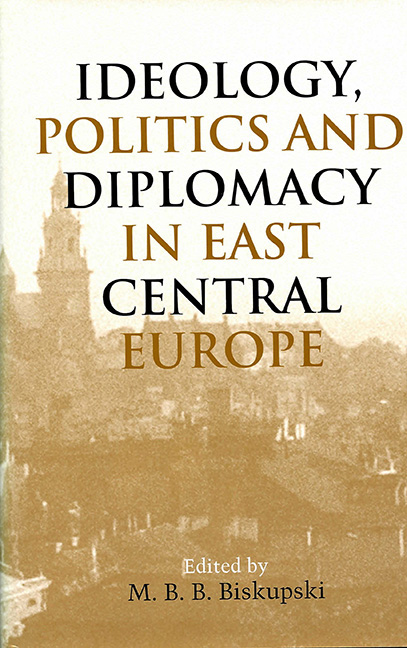Book contents
- Frontmatter
- Contents
- Preface
- Tabula Honoraria
- Piotr Wandycz
- Piotr Wandycz: An Appreciation
- 1 A Comparison of Czech Politics in Bohemia with Czech Politics in Moravia, 1860–1914
- 2 Strategy, Politics, and Suffering: The Wartime Relief of Belgium, Serbia, and Poland, 1914–1918
- 3 “This Troublesome Question”: The United States and the “Polish Pogroms” of 1918–1919
- 4 The Socialist Imprint on International Relations in Interwar Europe
- 5 Hungarian Americans during World War II: Their Role in Defending Hungary's Interests
- 6 The Nazi-Soviet Pact of August 23, 1939: When Did Stalin Decide to Align with Hitler, and Was Poland the Culprit?
- 7 Poland, the GDR, and the “Ulbricht Doctrine”
- Writings of Piotr S. Wandycz
- Contributors
- Index
7 - Poland, the GDR, and the “Ulbricht Doctrine”
Published online by Cambridge University Press: 11 May 2017
- Frontmatter
- Contents
- Preface
- Tabula Honoraria
- Piotr Wandycz
- Piotr Wandycz: An Appreciation
- 1 A Comparison of Czech Politics in Bohemia with Czech Politics in Moravia, 1860–1914
- 2 Strategy, Politics, and Suffering: The Wartime Relief of Belgium, Serbia, and Poland, 1914–1918
- 3 “This Troublesome Question”: The United States and the “Polish Pogroms” of 1918–1919
- 4 The Socialist Imprint on International Relations in Interwar Europe
- 5 Hungarian Americans during World War II: Their Role in Defending Hungary's Interests
- 6 The Nazi-Soviet Pact of August 23, 1939: When Did Stalin Decide to Align with Hitler, and Was Poland the Culprit?
- 7 Poland, the GDR, and the “Ulbricht Doctrine”
- Writings of Piotr S. Wandycz
- Contributors
- Index
Summary
Most of the existing scholarship on the cold war in Europe during the 1960s posits the existence of an “Ulbricht Doctrine”: an East German dictate, forced upon the other Warsaw Pact states, not to establish diplomatic relations with Bonn until it first recognized the GDR. Most accounts date the “Ulbricht Doctrine” back to the meeting in February 1967 of the Warsaw Pact foreign ministers in Warsaw. The term itself originated in the Federal Republic of Germany (FRG), where analysts began to suggest in early 1967 that at the very moment when Bonn was ready to drop (or at least revise) the Hallstein Doctrine to permit diplomatic relations with Eastern Europe, the GDR had stepped in with its own doctrine—an “Ulbricht Doctrine”—to prevent their establishment. Such theorizing is in keeping with most West German scholarship on the GDR, which tends to focus on comparisons and interactions between the two German states and to ignore linkages among the GDR and the other socialist states, with the possible exception of the Soviet Union.
The situation within the Warsaw Pact, however, was more complicated than that suggested by the “Ulbricht Doctrine” thesis. In fact, Poland's communist leader, Władysław Gomułka, stood behind the successful con-vocation of the Warsaw Pact foreign ministers’ meeting in February 1967. The secret agreement that came out of the conference reflected as much Polish, as East German, thinking. It listed a number of preconditions that Bonn would have to meet before the other socialist states would be allowed to establish diplomatic relations with the FRG, including not only recognition of the GDR, but also recognition of Poland's western border, the Oder-Neisse Line. Within the Soviet bloc, this list of demands came to be known as the “Warsaw Package,” and not the “Ulbricht Doctrine.”
The “Warsaw Package” had its origins in the threat of isolation that arose for both Warsaw and East Berlin as a result of Bonn's adoption of a more active Ostpolitik in 1966. At a time when the FRG still refused to recognize either the GDR or Poland's western border, the Oder-Neisse Line, the other Warsaw Pact states were on the verge of normalizing relations with Bonn. Both the “Southern Tier” of the pact (Hungary, Romania, and Bulgaria) and, increasingly, Czechoslovakia saw in closer political relations with Bonn an opportunity to increase trade and obtain much-needed capital to purchase investment goods from the West.
- Type
- Chapter
- Information
- Ideology, Politics, and Diplomacy in East Central Europe , pp. 227 - 241Publisher: Boydell & BrewerPrint publication year: 2003

